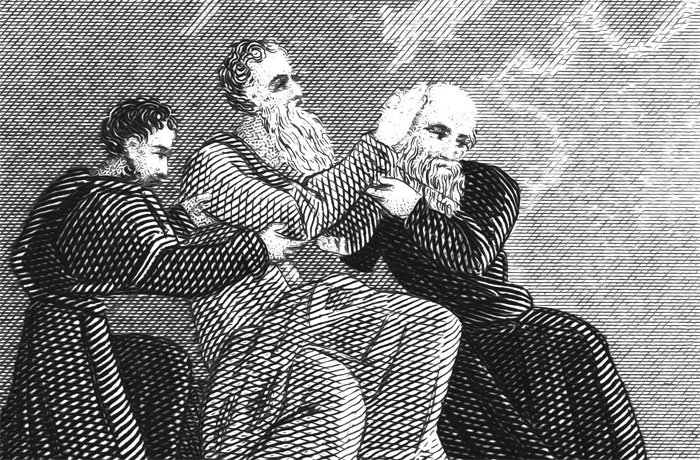 Old engraved illustration of Amalek (Amalekites) defeated (mikroman6 / Getty Images)
Old engraved illustration of Amalek (Amalekites) defeated (mikroman6 / Getty Images) There are some pretty despicable characters sprinkled throughout the Hebrew Bible; Amalek and his followers are among the worst. Exodus 17:8-16 recounts that, not long after the glorious celebration of dance and song described so beautifully in the Song of Miriam, the Israelites were ambushed by the Amalekites. We learn more about the brutality of the attack near the conclusion of the Torah, in Deuteronomy 25:17-18: “Remember what Amalek did to you on your journey, after you left Egypt — how, undeterred by the fear of G-d, he surprised you on the march, when you were famished and weary, and cut down all the stragglers in your rear.” The implication is that if there are any accepted rules of warfare, the Amalekites ignored them with their ruthless barbarity.
Sound familiar?
But the Torah continues with a passage that used to mystify me. Deuteronomy 25:19 implores us that while “you shall blot out the memory of Amalek from under heaven. Do not forget!” Isn’t that paradoxical? How can you possibly remember something that you erase from your memory?
I wrestled with that puzzle when we read that parsha just a few weeks ago, before our lives were suddenly filled with anger and sorrow. I understand the words of the Torah a bit better now.
The Amalekites, eternal enemies of the Jewish people, are said to be the embodiment of pure evil. Just as the Nazis were the 20th century’s version of Amalek, Hamas has proven that they are the Amalek of today.
The Amalekites, eternal enemies of the Jewish people, are said to be the embodiment of pure evil. Just as the Nazis were the 20th century’s version of Amalek, Hamas has proven that they are the Amalek of today.
I see the words “Do not forget” as an admonition to minimize the chances that this nightmare will happen again. Learn from military intelligence mistakes, don’t trust in the humanity of enemies who have none, and always remain vigilant.
So why blot out the memory of those monsters? Perhaps it has to do with self-care. Must we relive the hideous evidence over and over again in order to honor the lives of the slaughtered innocents? Personally, I have tried to avoid some of the most horrific videos and accounts. Going down that rabbit hole not only leads to despair, it is giving in to what Hamas wants us to do. They, like ISIS before them, make no attempt to hide their crimes. To the contrary, they seek to maximize their exposure. The more gruesome, the better. Why? They want us to be distracted, scared, and distraught. They would like nothing more than to have us lie awake at night, immobilized with rage and fear.
Self-care is an integral component of Judaism. While not turning a blind eye to the recent and ongoing horrors against Jews playing out both in the Middle East and across the world, we should allow ourselves to take an occasional break from our televisions, computers, and social media. Every so often try falling asleep listening to Mendelssohn, not CNN. Visualize a simcha, not Hamas supporters celebrating atrocities. Don’t forget to keep doing whatever it is that sustains you. Take a long walk; attend religious services; watch a romcom; hug your loved ones. In other words, don’t let our enemies steal our souls.
At this stage, I doubt that many of us need be reminded of what Hamas did to our people. And I suspect that we agree on what we need to do in return. If we ever hope to live in peace alongside our Palestinian neighbors, Hamas, like Amalek, must be removed from the world.
But at the same time, we owe it to ourselves to focus on our own health, and on the well-being of our families, our friends, and our community. Ask each other: Are you taking care of yourself? And be especially mindful of the extraordinary pressure that our clergy and our lay leaders are under, as they comfort others while working to ensure that their congregations and other gathering spaces are safe places for prayer, learning, and reflection.
Let’s not give the enemy what it wants. Without our mental and physical health, we will not have the strength and the clarity to do what must be done.
Morton Schapiro is the former president of Williams College and Northwestern University. His most recent book (with Gary Saul Morson) is “Minds Wide Shut: How the New Fundamentalisms Divide Us.”























 More news and opinions than at a Shabbat dinner, right in your inbox.
More news and opinions than at a Shabbat dinner, right in your inbox.